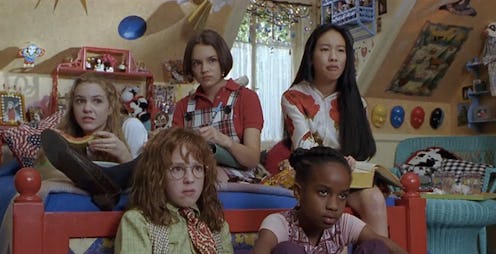Entertainment
Was 'The Baby-Sitters Club Movie' Feminist?

I've proclaimed my love for The Baby-Sitters Clubs and all of its most awkward forms. Of course the 1990 TV show is the most notable travesty, but I have genuine soft-spot for the also terrible, but lovingly terrible, 1995 Baby-Sitters Club movie. And as the film approaches its 20th anniversary, it's suddenly dawning on me why I give the ridiculousness a free pass: because at its core, it hones some photo feminist aspects.
Of course I don't mean this in any grand way. Let's be real, The Baby-Sitters Club isn't the Bikini Kill of middle school organizations. But there's a lot of things about the film, it's conception, and it's very positive focus on female friendship that are worth noting. The message of The Baby-Sitters Club, although it isn't blatant, is clearly one about girl power. And even those who try to take it down (ahem, Cokie Mason et al) can't break through their strong ties.
SO in celebration of this still admittedly strange adaptation, I'm going to do something crazy and out of character for me: I'm going to point out all the good. So here's 7 feminist things to appreciate from the one and only Baby-Sitters Club movie.
1. It Was Directed And Written By Women
Melanie Mayron and Dalene Young, respectively. Of course the ORIGINAL series was written by American hero Ann M. Martin. Or, you know, at least the first few books before ghostwriters took the wheel. Still, when it comes to The Baby-Sitters Club movie, you don't have to worry about the female voice being represented.
2. It DEFINITELY Passes The Bechdel Test
To recap, the rules are as follows: a conversation has to include at least two women who are having at least one conversation about something other than a man or men. They're tweenage girls, obviously boys come up now and then, but for every few of those there's SEVERAL other conversations going on. Some of it is about responsibility, some of it is about making sweet, sweet money, but definitely not all of it is about men.
3. And While Romance IS In The Film, It's Not The Most Prominent Plotline
Alan Gray is weirdly in pursuit of Dawn, Mary-Anne is having Logan problems, and Stacey's subplot with Luca almost tanks the film into statutory rape territory. THAT ASIDE, the overarching story arc isn't about winning a guy's heart, it's about summer and the magic it can bring.
4. So, It Highlights The Entrepreneurial Skills Of Junior High School Age Girls
They raise money all summer and fix up a greenhouse in the efforts to make an official office. That's AWESOME. You know what I was doing at 13? Spending half my day on Neopets and the other half of my day listening to Evanescence and crying.
5. All Of The Girls Eventually Summon The Bravery To Speak Their Mind
Kristy has the courage to tell her dad that like, he's a garbage dad and stuff. She puts up with a lot of his shit, but I think that's important given the awkward position she was put in.
6. Everyone Gets Their Own Spot In The Sunlight... Well, Almost Everyone
The junior club members get pretty much booted out of a subplot, but the core five 13-year-olds all get a fair share of screen time documenting their own unique struggles. Dawn reaches out to a fellow nature lover. Stacey dates that elderly gentlemen. Kristy has her daddy issues. And Claudia learns how to science. Overall, screen time is generously shared.
7. But Most Of All, The Baby-Sitters Club Is Feminist Because Of The Importance It Places On Supportive Female Friendships
When Kristy was off caught in the rain, it was her friends who came to her emotional (and literal) aid. When Claudia was having a rough time in biology, it was her friends who put together an embarrassing rap about the central nervous system. The BSC is amazing because it really drills the idea of "Friends Forever" into your mind, and it's a beautiful thing to watch. Even though, um, "Friends Forever" still really isn't a wish, Kristy.
Images: Columbia Pictures (38); Giphy (1)